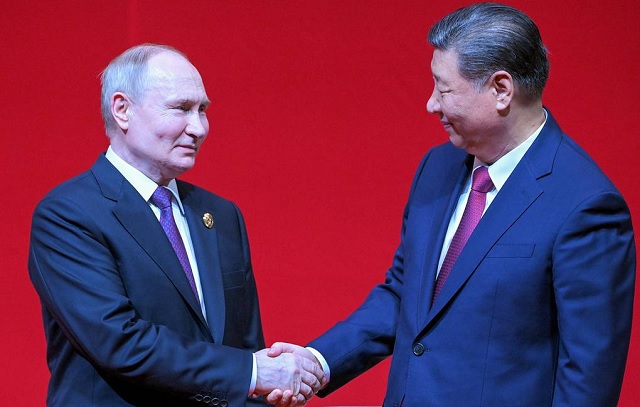
MOSCOW, Russia | TASS | Russian President Vladimir Putin and Chinese President Xi Jinping said a firm NO to the West’s diktat during the Russian leader’s visit to China, Alexey Maslov, the director of the Institute of Asian and African Countries at the Moscow State University, has told TASS.
“Positions on the most important international issues were agreed upon. This, perhaps, was the main agenda. It is obvious that Russia and China share the understanding of the multipolarity of the external world and how the global world should develop in the future – a world without economic borders, isolation or sanctions,” Maslov said.
It is obvious that Russia and China see eye to eye as to how major international conflicts should be resolved, he pointed out.
“First of all, through negotiations and security guarantees to all parties. In this case, we do not have any disagreement,” he said.
Putin and Xi Jinping also agreed during the talks that it was necessary to jointly develop approaches to resolving all economic and political contradictions between the countries, and this is a very important outcome, he noted.
Strength of positions
Maslov drew attention to the fact that China proposed the most realistic position on conflict resolution in general and on Ukraine in particular.
“The Chinese position in many respects is that without any preliminary requirements addressed to one of the parties, first there should be a stop to military operations, followed by negotiations on this basis,” he explained. “Also, China demands non-interference of any third countries in such conflicts. Russia shares this viewpoint 100%”
This approach, he said, “noticeably strengthens both the Russian and Chinese position on the settlement of the Ukrainian conflict.”
“We see that against the background of such agreements, many countries, including some BRICS countries, refused to participate in the Swiss summit on Ukraine,” Maslov said. He also pointed out that now there was “a consolidated position of Russia and China on the entire agenda of international cooperation,” while for the last five years all initiatives on how to solve conflicts and how to communicate with countries came only from the American side.
Maslov described as an important outcome China’s statement that it was meaningless to participate in the peace conference in Switzerland without Russia.
“It will be unconstructive absolutely. Brazil and South Africa adhere to this point of view, too,” he pointed out.
Growing supplies to China
Putin and Xi Jinping discussed many economic issues.
“This concerns the expansion of our supplies of farm produce to China,” Maslov pointed out. “Apparently, practically all issues related to the supply of beef and topinambour have been settled and all sanitary restrictions have been adjusted and removed. This is very important for Russia, because Russia is gradually becoming the main supplier of agricultural products to the Chinese market”.
No statements have been made regarding gas export to China.
“This indicates that many issues have not yet been agreed upon with the Chinese side. Russia has repeatedly stated that all technical issues have already been removed. Naturally, these issues will certainly be discussed before the end of this year,” Maslov said.
He described as a success the Harbin International Trade and Economic Fair, which Putin visited during the trip. It showed that “the range of goods that Russia is ready to supply to China has significantly expanded.”
Steady development of relations
Russian-Chinese relations are developing very gradually and very predictably, Maslov noted. “And this is very good, because everything is worked out at the level of subtle nuances,” he is convinced. “Now we have made progress in understanding how international conflicts should be resolved.”
Maslov attributed the absence of statements about the start of major projects to the fact that China was afraid of secondary sanctions and believed that the most important thing was to settle the main conflicts first, before new projects could be launched.
“Any projects now will be stalled without resolving the conflicts in the Middle East and the conflict around Ukraine. And, of course, the conflict related to Taiwan. China is very interested in resolving the latter,” the expert concluded.
******
SOURCE: TASS
 The Independent Uganda: You get the Truth we Pay the Price
The Independent Uganda: You get the Truth we Pay the Price





